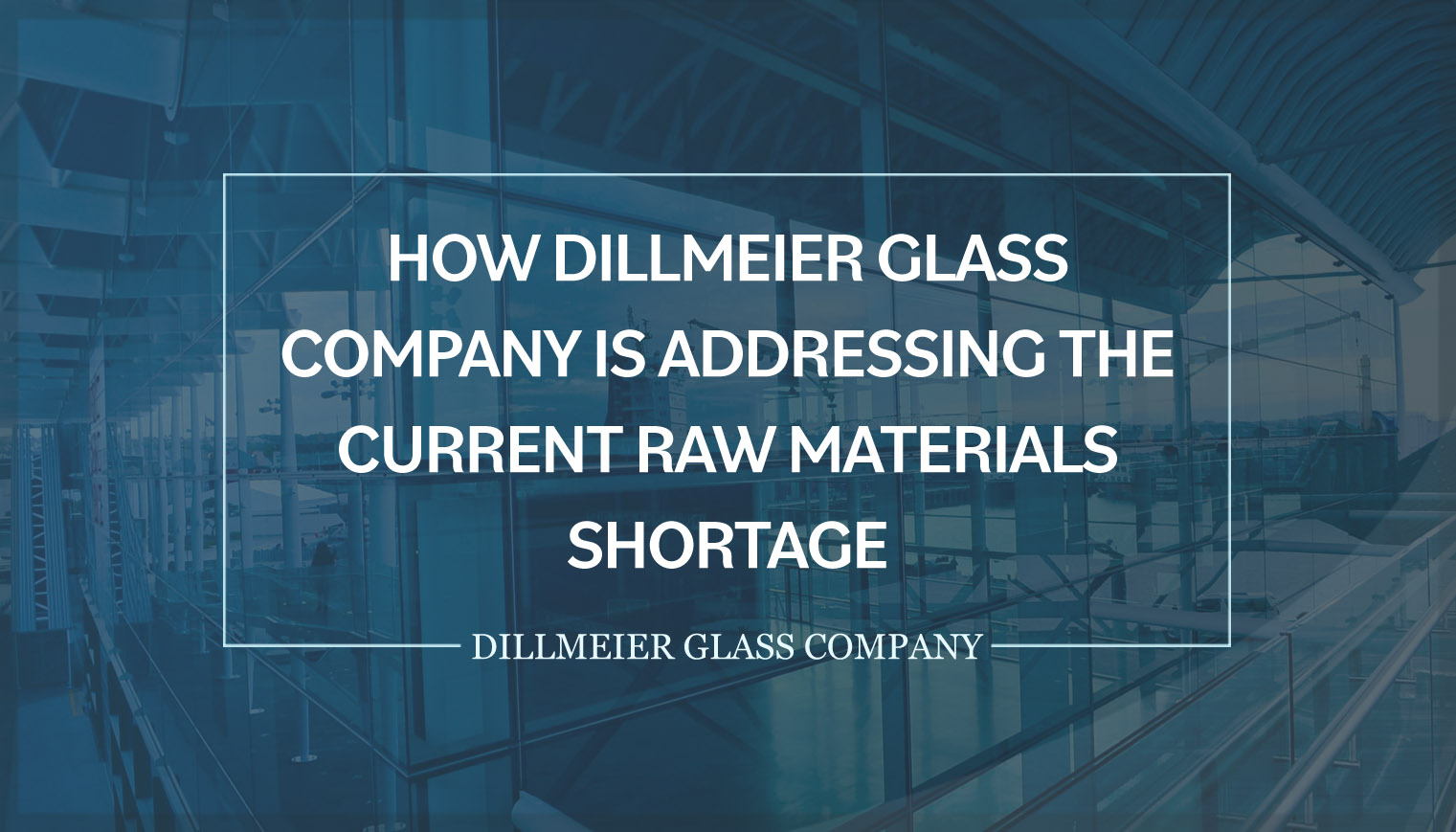How Dillmeier Glass Company Is Addressing the Raw Materials Shortage

The worldwide raw materials shortage continues to plague several critical industries including lumber, metal, glass, and even sand. While this affects float manufacturers, and also fabricators such as Dillmeier Glass Company, it begins early in the manufacturing process: Sand is one of the primary ingredients used to create and manufacture glass.
According to a United Nations report “Sand and Sustainability: Finding new solutions for environmental governance of global sand resources,” current sand usage is exceeding the rate at which it’s being produced. Caused by several circumstances, the current building boom is the chief contributor.
According to industry publication Glass Magazine, there’s also a polyvinyl butyral (PVB) shortage. Used for fabricating laminated glass, this thermoplastic is experiencing delays due to the current economy and active hurricane season.
Below we’ll discuss the current glass shortage and how Dillmeier Glass Company is addressing this for its customers, suppliers, and partners.
Increased Construction &
Float Glass Demand
“The float plants have done an excellent job in restarting their furnaces and getting plants back online. The communication has been great, and more trucks are now starting to arrive at our Arkansas fabrication facility.” —David Dillmeier, CEO, Dillmeier Glass Company
With both residential and commercial construction booming, the overextended float glass market is squeezed even further. This material’s versatility, flexibility, and durability make it one of the most popular choices for most industries utilizing glass applications.
According to a 2020 report by market advisory firm Mordor Intelligence, worldwide construction will reach $8 trillion by 2030, with the United States, China, and India primary drivers.
Even with these record-setting numbers, Max Perilstein, founder of glass fabrication industry consulting firm Sole Source Consultants, forecasts the current construction and real estate growth spurt has to settle down at some point.
“I would say that by the middle of next year, something is expected to change,” he says. “It can’t keep going on the way it is for much longer based on where the market is today. The shipping lanes will eventually open up, and while there might be some pockets where more shipments come in faster than others, I think things will be better.”
Already optimistic about positive changes in the near future, David Dillmeier, CEO of Dillmeier Glass Company, agrees with Perilstein’s projections.
“We are just starting to see domestic glass free up,” he shares. “The float plants have done an excellent job in restarting their furnaces and getting plants back online. The communication has been great, and more trucks are now starting to arrive at our Arkansas fabrication facility.”
Residential vs. Commercial Glass Projects
While Dillmeier Glass Company doesn't work on residential projects, float glass production and shipments still affect commercial jobs—regardless of application and industry.
“Because residential and commercial [fabricators] all buy their glass from the same float glass plants, the biggest thing is that because there’s a raw materials shortage—and there are limited U.S.-based float plants—it's already a very limited pool to choose from,” explains Perilstein. “And when you have all of these [business] segments buying from the same plants, there will be a shortage. So that’s what the fabricators are up against—the industry was never ready for everyone to be this busy.”
Despite these shortages and bottlenecks, Dillmeier Glass Company’s operations and processes have experienced limited interruptions.
“Our production and purchasing team have done an incredible job of communicating with the float suppliers on our glass needs,” Dillmeier says. “This has enabled us to see minimal disruption in production of customer orders. We have great relationships with all of the float suppliers, and in difficult times, it’s great to know that we have wonderful partners.”
A Perfect Storm Supply Chain
The glass shortage could also be described as a domino effect, originating at float glass manufacturing plants then impacting logistics processors and delivery drivers, and concluding with the glass installers. Together, these obstacles have resulted in what many have dubbed a perfect storm supply chain.
“The term ‘perfect storm’ has been used to describe the current glass shortage,” explains Dillmeier. “There is no main force, but many disruptions are occurring, such as float plants down for reconditioning, overseas glass delays, increased pricing, and an increase in automotive and residential glass usage.”
Perilstein adds that fabricators could previously lean on international suppliers if they couldn’t obtain glass in the United States. However, with current international logistics challenges, it’s therefore recommended to work with a U.S.-based fabricator.
“We continue to use only U.S.-manufactured float glass, so we have not experienced any overseas disruptions,” Dillmeier says. “The delays happening at the ports all around the world are constantly pushing back delivery dates and lead times, and therefore frustrating the end user.”
Despite materials shortages and bottlenecks, Dillmeier Glass Company’s operations and processes have experienced limited interruptions.
Staying Ahead of the Curve
With the shortage possibly causing longer-than-usual project completion times, fabricators such as Dillmeier Glass Company are remaining proactive and diligent. With long-term partnerships and customer loyalty at the core of its business model, the company prides itself on honesty and transparency.
“Communication on all fronts is the key to so many issues,” Dillmeier says. “As we communicate our needs to the float plants and then relay manageable lead times for our customers, everyone has been able to expedite the proper schedules. In addition, we have asked customers to provide us with potential jobs, so that helps us forecast and plan glass purchases and production.”
Four Generations of Expertise
As a fourth-generation glass fabricator, Dillmeier Glass Company has a wealth of experience, technical knowledge, and a unique shipping and crating process to help lessen the effects of the current glass shortage.
Contact us to today for more information on how we can help navigate your current glass project.


